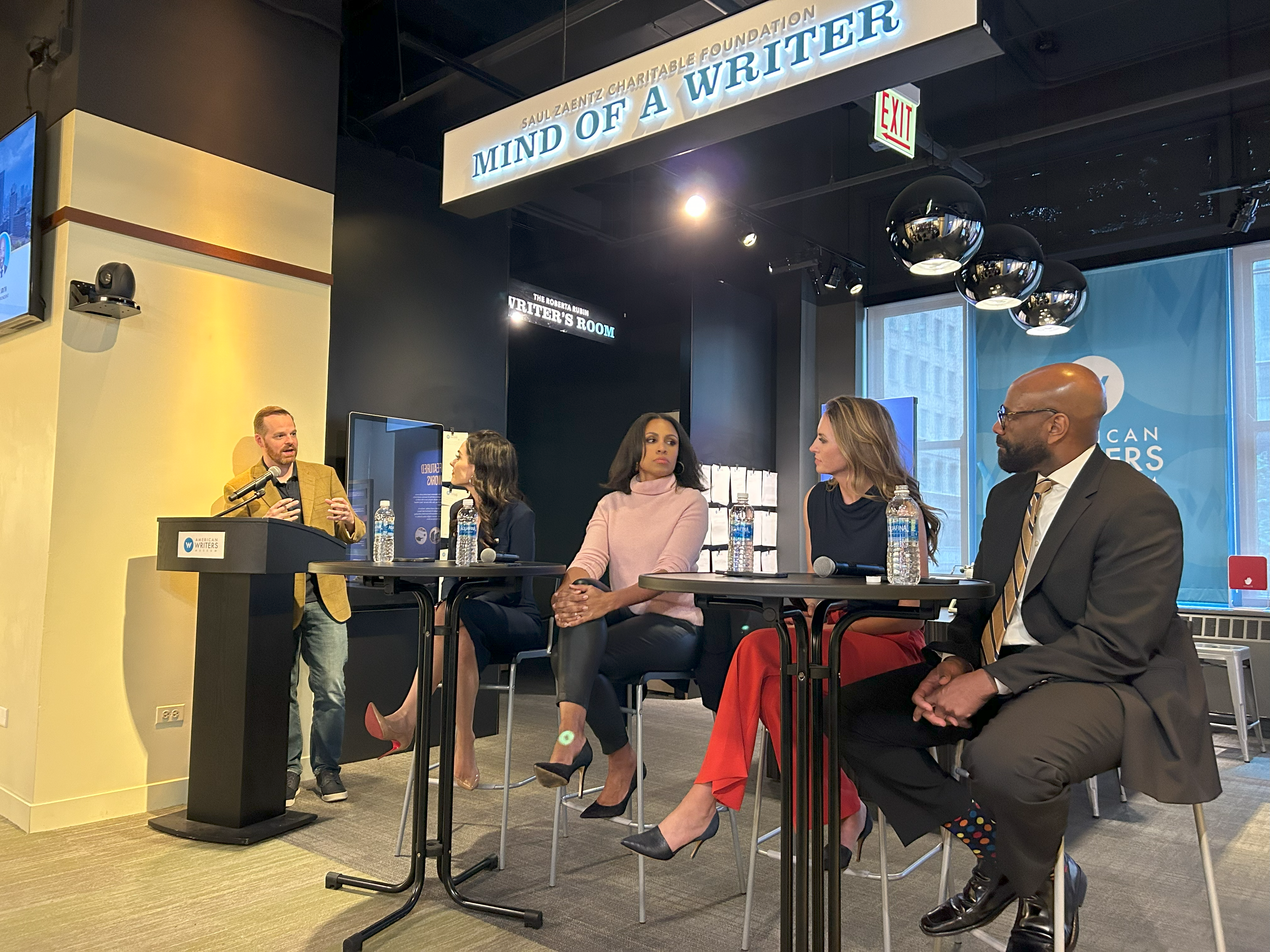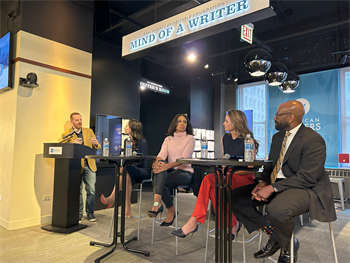
Behind the Scenes Look Offered of Popular Morning Cable Show
By Dominic Calabrese, Past PCC President
Wednesday, September 27, 2023

PCC members and guests were given a close-up view of NewsNation's popular Morning in America program during a special panel discussion on September 20.
The event took place at the American Writers Museum, 180 N. Michigan.
Offering their perspectives were Morning in America co-hosts Adrienne Bankert and Markie Martin along with correspondents Kelsey Kernstine and Nick Smith.
The broadcast, which is celebrating its third anniversary, airs four hours each morning, from 5 AM to 9 AM (Central Time) weekdays on more than 200 stations across the country as well as a wide array of other platforms.
Bankert, who previously reported for ABC News in New York, notes how rapidly NewsNation has taken off in just three years.
"We have been going at breakneck speed, adding programming and recently began airing 24 hours, seven days a week," she says.
The additional time for Morning in America requires Bankert to awake even earlier each morning at 1:30 AM.
"I don't really mind," she smiles, "because I am passionate about the stories we cover and I know that we are making a difference in the lives of people we are profiling as well as our viewers."
Bankert maintains that NewsNation is different from the competition because it focuses on reporting in an unbiased and objective way, stories that impact the lives of everyday Americans from all walks of life.
Martin adds that NewsNation's approach to the news is what won her over.
"I was turned off by cable news programming because I found it to be divisive, argumentative, slanted towards one point of view and by and large, negative," she says. "Here at Morning in America, our job is to just report the news, present all the facts and let our viewers make up their own minds."
Smith, the only Chicago area native on the panel, says that he and his colleagues are guided by a core principle, "Do it and do it right and don't make mistakes."
"It is incumbent upon us to take great care in reporting the news and to make sure that we are getting all our facts right, including the correct pronunciation of the people and places we are reporting on." he says.
As an example, Smith points to the train wreck last winter in East Palestine, Ohio.
"We wanted to make sure that we pronounced the town's name correctly because that was where those people live, it was important to them that we said it the correct way."
Along these lines, Kernstine notes that all four panelists work closely together, offer suggestions and double check each other's material.
"We are also aided by a great backup team of researchers, producers, editors and others who do a lot of the behind the scenes work," she says, adding that while the on-air talent gets the credit, the entire effort is the result of solid teamwork.
Kernstine adds that an important element of that team approach involves using local reporters and incorporating local stories into the national newscast.
"If I am reporting on an issue someplace in Michigan, it behooves us to fully utilize that local on the scene reporter who is based there and understands the situation," she says. "Doing this really brings true justice to the story."
Smith, who like Kernstine, is often asked to report from locations across the country, agrees.
"In reality, we are profiling developments in disparate communities across America, so that local perspective is critical," he maintains.
Kernstine adds that in effect, they are giving a voice to those Americans doing newsworthy things who don't have a microphone.
One of those stories involves truck drivers. The panel notes that these individuals are unsung heroes who are really the backbone of our national economy.
"We love to go on Amazon and order something then have it magically come to our house," Bankert says. "However a lot goes into that process and we wanted to profile the people who make it happen."
All four panelists expressed the view that it good to show empathy in their reporting so as to be more authentic and to better identify with their viewers.
"We may need to take another look at what traditional journalism schools teach that reporters should take themselves out of the stories they cover,' Bankert says, adding that the real-life experiences they may have had in losing a loved one or serving as a veteran or being a person of faith adds credibility to their reporting.
"This is the first network I've worked at where I was encouraged to acknowledge that I am a veteran," Smith adds, pointing out that for too long, most mainstream media outlets have looked askance at military service.
Another area that has been taboo is religion. "I have news for them, most Americans are people of faith," Bankert observes. "We are a very diverse nation in terms of our beliefs but the great majority of people in this country are guided by faith so that is a legitimate issue to report."
Noting that her co-host Markie Martin is originally from Oklahoma, she adds that NewsNation also encourages bringing regional perspectives as well as many other viewpoints to the table, making for more well rounded and thoughtful reporting.
The panel feels that this overall approach to covering the news must be working as the other networks are beginning to pay attention and emulate some of NewsNation's reporting.
"In our effort to just cover the news without shaping it, we have done profiles recently of presidential candidates, Robert F. Kennedy, Jr., Chris Christie and Vivek Ramaswamy," Bankert points out, adding that her old employer, ABC, just did a piece on Ramaswamy.
"While they would never admit it, I'm sure their decision in doing so was based on our effort," she says. "They view us as the new kid on the block that's covering the news in a spunky, gritty sort of way that's informative and interesting."
When asked by PCC Executive Director Tweed Thornton what the panel thought of the Windy City since their national broadcast is based here, all four were effusive in their praise.
While initially somewhat reticent to relocate to Chicago, Bankert admits to falling in love with the city.
"Why didn't anyone tell me how beautiful and clean this city is, " she asks, recalling that when she first arrived on a cold January day, she took a walk and was fascinated by Marina City and other samples of Chicago's stunning architecture.
"This city has made so many contributions to American life like music, architecture, industry, science and other areas," she observes, "that it is a shame the national media focuses instead on a negative narrative."
Martin concurs, noting that her decision to move to Chicago was met with skepticism from her family and friends who see the city through the prism of crime and violence.
She maintains that NewsNation's presence in Chicago will help showcase the trend setters and thought leaders who hail from here along with other positive attributes about the city.
Since Morning in America originates locally in studios it shares with WGN TV on the northwest side, the panel encourages PCC members to pitch their story ideas, provided that they would have some interest to a national audience and also have visual appeal.
"We're on the air each weekday for four hours and we all have our phones so send us your tweets," Martin says.
Bankert suggests that to enhance your chances, keep the pitches simple and short and include a link.
"If you tell me that you have a real person with a story I can speak with along with a visual element like a video plus some times to talk, I'm there," Smith says.